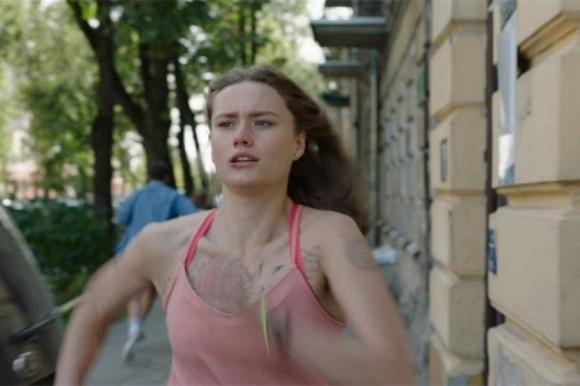Scanorama premiere. Run to destruction

Don't throw away what you've broken, you'll fix it, says the folklore of life. And if this idea seems quite welcome when it comes to material possessions, in relationships this approach does not necessarily bode well. Especially if fixing relationships starts to work not like glue, but rather like some hammer that has smashed every last of the remainders and left nothing but dust behind.
In Andrius Blaževičius' latest film "Runner", presented to the Lithuanian audience during the Scanorama European Film Forum, the focus is on the relationship that Marija (played by Žygimantė Jakštaitė) tries to glue together, but this attempt cannot be called successful.
Jakštaitė's Marija is a young girl, still a student, trying to survive in the city according to the rules dictated by the latter. One could even call her quite impulsive, but that impulsiveness clearly stems from a desire to take care of others. This is how she gets caught up in a relationship with Vytas (played by Marius Repšys), which has quite a destructive effect on her. And Vytas, as can be assumed, has a psychosis.
Marija seems like she could completely lose herself just to save Vytas – she will run away from work in the middle of the day, and try to find him with the help of her friend while wandering around the city, and she will ignore the violence used against her, forget to take care of herself. In her portrayal of Marija, Jakštaitė perfectly combines a kind of indifference to the world, fear, inner anxiety and endless, even hardly logically explainable care. In her every step, one can feel the insecurity, the frustration caused by the environment and the rules dictated by it, and the desire to break free. Except that there isn't even a slightest hint of this freedom, because Marija has taken it away from her herself.
We rarely see Vytas on the screen, he is like a mystical figure who is fluid like some kind of wind – he is always there, the action revolves around him, but Vytas himself is not directly involved in it. Caught up in a manic episode, accompanied by psychoses, this character is a difficult case for those around him. He pushes Marija as far away as possible and hides from her, either at parties or somewhere else, while his mother seems to have come to terms with this strange situation. And Marija, though constantly rejected, still tries to catch him – only in the long run, and especially towards the end of the film, the question arises: is she catching Vytas, or is she just catching the idea of him? She seems to be so involved in the marathon for Vytas that she runs away from the decision to take care of her own well-being and chases a toxic trap. A small lesson, that in order to take care of someone else, you must not forget yourself.
In the “Runner”, as in Blaževičius' previous films, we see realistic, urban aesthetic. Glamour is not to be found here – the closest you will get to it is maybe in the club scenes, where everything is obscured by cold neon. In his films, the director seems to let the city have its say, making it almost an equally important character. While in “The Saint”, the grey Soviet-built blocks of flats of an unnamed district and the dirty, cold courtyards were more eloquent than all the dialogue, in the “Runner”, the Antakalnis district of Vilnius speaks. Many others often choose to show the facade sides of Vilnius – the Old Town, Konstitucijos avenue or the cleaned-up part of the New Town, or the exotic – the ‘Shanghai’ or the backstreets of the station area. But Blaževičius chooses perhaps the most iconic district, where there is no shortage of the greyness of the blocks of flats, nor of the more interesting, clearly older buildings, with all kinds of shops on the ground floor. For him, it seems, it is important to capture real life as it happens, not the idea of it. With all the hospitals and clinics, with the passers-by. Against the backdrop of this aesthetic, the relationship between Marija and Vytas and the entire process of chasing acquires a sense of reality.
I would also like to single out the soundtrack, which probably played the best role in the attempt to turn the ‘Runner’ into a thriller. This is why I would like to advise you to watch the film in a cinema if you can, because otherwise a lot of the components of the film will simply not be conveyed. And the makers of the film have played with the sound here manipulatively in a good sense – the rhythm, with all the chases and runs (I'm reminded of the beginning of the film ‘Drive!’), and all the tricks, where something seems to be happening in the auditorium and not on the screen, guarantees an immersive experience. And the music, which contributes to conveying the overall atmosphere of the city.
And it's even strange how Blaževičius, who made "The Saint", probably the slowest film of the last decade (in which time seems to just sit there), has released such a rhythmic, fast-paced, action-packed film, while still managing to stay true to his own style. And a film that can be relevant not only to local audience, but can also travel abroad without fear of being misunderstood. I think that with the ‘Runner’ Blaževičius has established a high position for himself among the younger generation of filmmakers who speak about their generation in a language that their generation understands. And he did it not in a banal, but in a professional way.